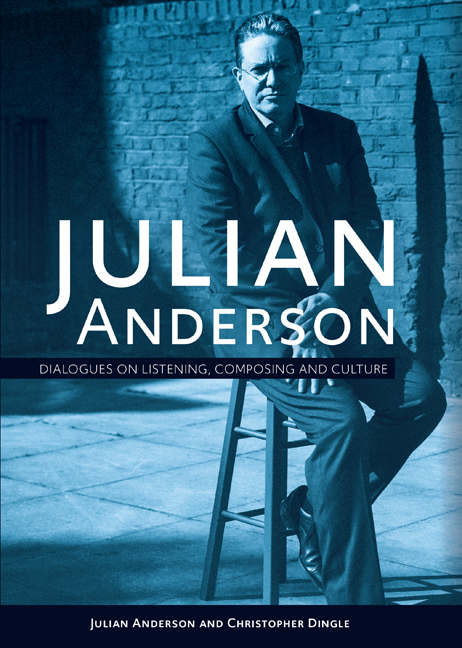Book contents
- Frontmatter
- Contents
- List of Illustrations
- Foreword
- Acknowledgements
- Introduction
- Prelude – Jeux: A Conversation Over Lunch
- Conversation One Origins
- Conversation Two Enthusiasms
- Conversation Three Training
- Conversation Four Dance
- Conversation Five Folk
- Conversation Six Composing (or Not)
- Conversation Seven Understandings
- Conversation Eight Beginnings (and Endings)
- Conversation Nine Puzzles
- Conversation Ten Singing
- Conversation Eleven Olly
- Conversation Twelve Memory
- Conversation Thirteen Opera
- Conversation Fourteen Practices
- Conversation Fifteen Outsiders?
- Conversation Sixteen Quartets
- Conversation Seventeen Advocacy
- Conversation Eighteen Partnerships
- Coda: Multiple Choices
- Chronology
- List of Personae
- Glossary of Musical Terms
- Macrotonality
- Catalogue of Published Works by Julian Anderson
- List of Recordings of Julian Anderson’s Music
- Bibliography
- Discography
- Index
Conversation One - Origins
Published online by Cambridge University Press: 16 September 2020
- Frontmatter
- Contents
- List of Illustrations
- Foreword
- Acknowledgements
- Introduction
- Prelude – Jeux: A Conversation Over Lunch
- Conversation One Origins
- Conversation Two Enthusiasms
- Conversation Three Training
- Conversation Four Dance
- Conversation Five Folk
- Conversation Six Composing (or Not)
- Conversation Seven Understandings
- Conversation Eight Beginnings (and Endings)
- Conversation Nine Puzzles
- Conversation Ten Singing
- Conversation Eleven Olly
- Conversation Twelve Memory
- Conversation Thirteen Opera
- Conversation Fourteen Practices
- Conversation Fifteen Outsiders?
- Conversation Sixteen Quartets
- Conversation Seventeen Advocacy
- Conversation Eighteen Partnerships
- Coda: Multiple Choices
- Chronology
- List of Personae
- Glossary of Musical Terms
- Macrotonality
- Catalogue of Published Works by Julian Anderson
- List of Recordings of Julian Anderson’s Music
- Bibliography
- Discography
- Index
Summary
In some respects, much of this conversation has most in common with a standard conversation book, covering the basics of Anderson's formative years and schooling. Even then, some might be disconcerted by swiftly encountering discussion of microbiology prompted by conveying some sense of his father's remarkable achievements. Discussion of instruments learnt is the catalyst for delving briefly into the world of playing percussion, while there is also some consideration given to potential alternative careers to music. The contributions of two early teachers, Oliver Knussen and John Baird, lead the conversation to key early works, notably Light Music (now classified as String Quartet No. 1), Ring Dance, Diptych and Khorovod. Finally, it is worth noting that part of Conversation Fifteen, Outsiders?, reflects on some aspects of Anderson's background that are given in straightforward terms here.
CD: Let's start at the very beginning with some sense of where you came from. Could you say something about your family background?
JA: It's not a musical one, in the sense that there are no professional musicians in the family now, and there never were that I know of, but there's a lot of good amateur music in the family. My father was a microbiologist, but he was very musical. He played the violin well enough to be able to play the Mendelssohn and the Bruch Concertos to a pretty good standard, so he was a talented violinist. I don't know if he ever could have been a pro, but he was a very gifted amateur. He was a literate music lover, whose tastes did not go beyond about The Rite of Spring and The Young Person's Guide to the Orchestra, but the standard repertoire he knew very well.
His microbiological activity interests me a lot. It's rather relevant now, because he discovered the mechanism by which bacteria spread resistance to antibiotics among themselves, a technique he termed ‘transferable resistance’. The important factor is that bacteria who have never encountered the antibiotic, with the help of this mechanism, can already be resistant to it. That's what they couldn't understand: how the bacterial resistance was spreading so quickly. This was a problem in farming originally, in the late ‘50s, early ‘60s, but it soon became a problem in the human use of such drugs. My father was very important in raising significant public awareness of the dangers of overusing antibiotics.
- Type
- Chapter
- Information
- Julian AndersonDialogues on Listening, Composing and Culture, pp. 7 - 25Publisher: Boydell & BrewerPrint publication year: 2020

